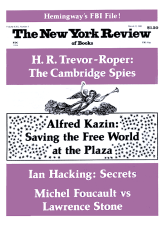In response to:
The Shrink Princess from the December 16, 1982 issue
To the Editors:
In her review of Celia Bertin’s Marie Bonaparte: A Life [“The Shrink Princess, NYR, December 16] Phyllis Grosskurth suggested the possibility that Ms. Bertin received access to the Bonaparte Papers in the Library of Congress which had been denied to herself. Dr. Frank Hartman in a letter to NYR [February 3], challenges the implication in Ms. Grosskurth’s review; Ms. Bertin, he affirms, did not receive “access to papers in the Library of Congress that Grosskurth was denied.” Dr. Hartman is correct. Neither Ms. Bertin, nor Dr. Hartman, nor any other scholar has received access to the Bonaparte Papers since they have been in the custody of the Library of Congress.
The imputation of granting preferential access to research materials is a particularly grave one for the Library of Congress—or for any library—to bear. The Library’s administration of the Bonaparte Papers refutes it.
In 1964 the Manuscript Division of the Library of Congress received, through the good offices of Anna Freud, a gift of the papers of Princess Marie. In donating the papers, Princess Marie stipulated that they be totally restricted until the year 2020. To preserve papers for scholarship, the Library of Congress accepts collections on which donors wish to place restrictions of access. In many cases donors will grant access to scholars who apply to them; the periods during which restrictions are imposed often expire, in any case, a few years after the donation. Donors of collections of psychoanalytic materials, in the interest of guarding the confidentiality between analyst and patient, tend to suggest restrictions for longer periods of time to protect the privacy of descendants and others who might be involved.
According to Dr. Hartman, Princess Marie’s family and heirs retained portions of her papers in Paris, access to which is governed by their own guidelines. Those Bonaparte Papers donated to the Library of Congress have been scrupulously administered according to the terms of the instrument of gift. No scholar, to repeat, has used them since they have been in our possession.
James H. Hutson
Chief, Manuscript Division
Library of Congress
Washington, DC
Phyllis Grosskurth replies:
James H. Hutson, Chief, Manuscript Division, Library of Congress, is completely mistaken in his belief that I suggested the Library of Congress had granted access to Celia Bertin, Frank Hartman, or any other scholar. I have never for a minute believed such a monstrous breach of faith could occur.
Dr. Hutson seems to accept totally Dr. Hartman’s contention that Princess Marie’s family retained “portions” of the Bonaparte papers. Again I ask: how does he know that they were only “portions”? Dr. Hutson has recently admitted to the University of Toronto Bulletin (February 21) that he did not know any of Marie Bonaparte’s papers had been retained by her heirs until he read the exchange between Dr. Hartman and myself. What puzzled me was that the material Bertin uses in her references bears such a close resemblance to the material listed in the Library of Congress holdings. When I originally wrote asking whether there were any conditions under which a scholar could examine this material, I was requesting in effect information as to whether there was any donor to whom I could apply. The answer was that the papers, on the written stipulation of Marie Bonaparte, were restricted until 2020 and “we must treat all applicants equally according to the agreement.” I was not referred to this apparent source. If there happen to be copies of this material available to selected persons does this not abrogate the point of restricting material to the general world of scholarship?
Dr. Hutson mentions requests by donors of psychoanalytic materials to restrict them in order to maintain privacy and confidentiality. But the situation is not always so clear. For example, when Diana Riviere, daughter of Joan Riviere, one of Freud’s major translators, sold the Freud-Riviere correspondence to the Sigmund Freud Archives, her impression was that it was to be, and should be, made available for the use of scholars. However, when I recently wrote Dr. K.R. Eissler, secretary of the Sigmund Freud Archives, that Ms. Riviere was agreeable to my seeing the letters, he replied that the Sigmund Freud Archives had acquired the letters through purchase, not donation, and had deposited them in the Library of Congress while restricting them until the year 2000. Thus the Sigmund Freud Archives is able to frustrate the expressed intention of the former owner of the important correspondence it acquired and Dr. Hutson has agreed to abide by the Archives’ restrictions whatever Ms. Riviere may want. What appears clear is that there is no way scholars in general can verify material if only selected persons are given access to it.
This Issue
March 31, 1983



